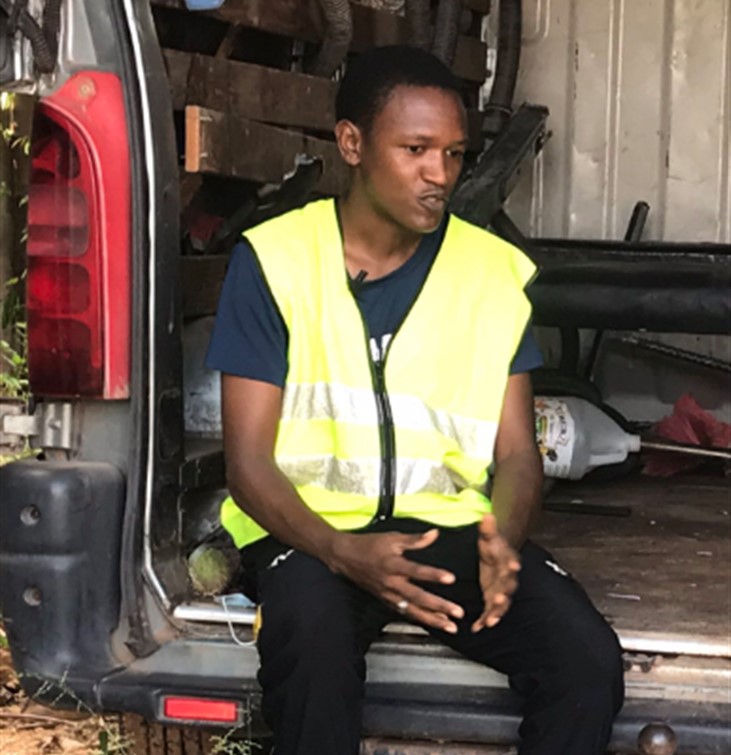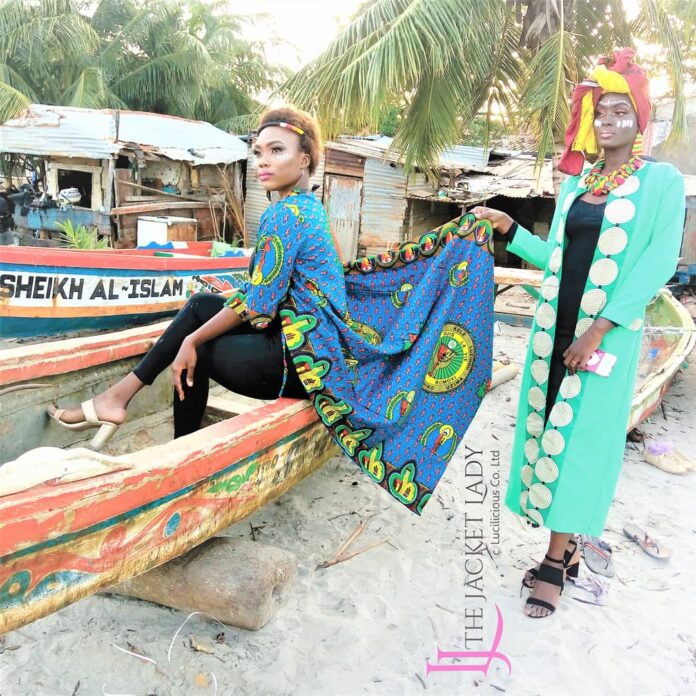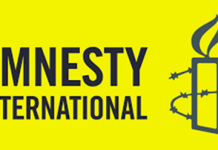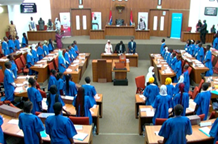By Ndey Sowe
Inspired by her love for jackets and saddened by the low quality she and many young women were faced with in The Gambia, Lucy Nichol, the Creative Director of The Jacket Lady, ventured on establishing her business to give women within the Greater Banjul Area an experience the market was not catering for.
The Jacket Lady is a start-up fashion business that offers jackets customized with Inspired African Wax print that are neatly sewed, perfectly finished, branded, and of high-quality.
The 30-year-old officially started her business in October, 2020 after a 6-month Fashion Incubation and Product Photography training supported by the Youth Empowerment Project Andadorr programme. The training gave her business a facelift and inspired a new path for her and others that benefited from it.
“The business training gave me the professional push I needed for the growth of my business. It helped me develop my business brand and packaging of my products,” she said.
In just a few months, she has seen major growth in her business and profit margin. For Lucy, she is moved by the message and the story behind every tailored jacket. With every woven African print on a jacket, she wants her clients to feel empowered, beautiful and remember their roots. She also wants them to stand tall, be bold and fall in love with the beauty embedded in their skin and culture.
In 5 years, Lucy wants The Jacket Lady to be a recognised brand worldwide that furthers the African story to global spaces. She calls on young people to believe in themselves because “Belief is what gets you started, keeps you going an d gets you where you want to.”

The Business Development component under GIZ focuses on building the skills of aspiring entrepreneurs or assisting newly established startups that are struggling to stand on their feet. Abass Bah is one of those beneficiaries.
Born and brought up in Bundung and graduated from Gambia High Senior Secondary School in 2012, Abass conceived the idea of doing business when he was working in a hotel as a glass cleaner. There, he used modern technology and equipment to carry out his job.
Being amazed by the possibilities of what such a job could offer in a relatively small market, Abass decided to utilize his skills more productively by setting up a cleaning business called Smart Cleaning.
Abass put together D5000 as startup capital, as he was determined to get the business started with the support of a few friends he worked with at the hotel.
“We did not have enough equipment to do the cleaning. We also had no idea how to start a business neither knew where to obtain the documents to run our own company. We also found it difficult to get contracts because we were overlooked and underrated due to our age,” he explained.
Abass continued working with the little resources he had until he received the YEP Tekki Fii mini-grant of D47,000 which he used to develop the business. He also received training and coaching from GIZ through GIEPA which he explained, has molded and shaped his experience in the field.
“They helped me become confident and showed me a path towards achieving my goals. They helped me to becomecreative and gave me ideas towards expanding my business,” Abass stated.
His professional cleaning service deals with private residences, commercial structures, offices and industrial cleaning including sofas, carpets, high level, and low-level glass cleanings.
“We are a product of our environment. The people we live with, our surroundings and especially the facilities and institutions that shape and propel our development and growth. These elements unconsciously shape our dreams, goals and to [a] larger extent the path we take, to become eve rything we want to be,” he said.

For Isatou K. Jallow, a young poultry farmer in Basse Santa Su, said the Veterinary Clinic right opposite her house was beyond just a clinic and a place to learn about animals, their health and care, but the veterinary clinic was the home to Isatou’s dreams and aspirations.
Since the inception of her poultry farm in 2019, Isatou has discovered learning guides and opportunities to develop her capacity and skills in the path she has chosen herself.
Currently, she has about 200-250 chickens which serve as her stable source of income and hopes to expand to a bigger farm in a few years in order to cater the growing market demands and needs in her community.
Isatou’s journey started in the veterinary clinic with Ousman Mballow who encouraged her to venture into the business and provided her with the necessary guidance to start. Recalling their first conversation about this venture, Isatou shared the kind words extended to her by Ousman Mballow.
“He told me to keep my head up and take this business seriously. That even though I am a woman, I will never regret this decision for myself, my family and others around me,” she recollected.
These words they had shared, she said, serve as her pillow of hope and guidance in times of stress, hardship, and any form of disruption in her business.
In striving to develop her capacity and excel in her business, Isatou is a member of the current poultry track of the Andandorr Programme under the Youth Empowerment Project. This programme provides her with the learning space, resources and access to successful persons in her field of work, to develop and harness her knowledge and skills.
“The Andandorr Programme has been a great improvement and benefit to my work and business. I have learnt a lot and acquired valuable experience that I did not know through the training,” she stated.
Through the training, Isatou shared that she has been able to improve her management skills and averse the loss of her chickens because of the heat. This, she described, is the most valuable addition to her business in recent years.
As a strong believer in “knowledge is power”, Isatou currently pays for her accountancy program at the University of The Gambia from the proceedings of her poultry farm. This, she believes, will help her develop and improve her financial management skills and other aspects of her business.
Through her work, growth and journey, Isatou chooses to challenge gender stereotypes, representation and equality for women and girls in The Gambia. She wants her work, beliefs and drive to inspire more women to carve their own paths and follow their dreams.
When asked what she wants to leave for women and girls, she shared: “We should work hard and provide for ourselves. We must invest in production and help ourselves. We cannot depend on other people who might end up maltreating us”.
About the Tekki Fi Project in The Gambia
The “Make it in The Gambia-Tekki Fii” is a program that aims to improve economic development and future prospects for The Gambia’s youth, including returning migrants, by promoting attractive employment and income opportunities.
Moreover, the objective is to support the Government to boost economic development with a focus on generating training, entrepreneurship, employment, and access to finance opportunities for Gambians.
The Tekki Fii campaign is a movement by Gambians and for Gambians. It is about helping young people in the country to see the benefits of choosing to ‘make it’ at home. The project is funded by the European Union Emergency Trust Fund for Africa (EUTF).
The implementing partners are; The International Trade Centre (ITC), The Deutsche Gesellschaft für Internationale Zusammenarbeit (GIZ) is a German development agency, Instituto Marquês de Valle Flôr (IMVF) is a foundation for development and cooperation based in Lisbon, and Enable is the development agency of the Belgian federal government, implementing and coordinating Belgium’s international development policy.



















